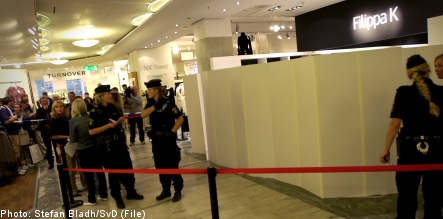In his new book released on Monday, Kris i Ledningen för Svensk Polis (‘A Crisis in Leadership for the Swedish Police’), former Stockholm police superintendent Eric Rönnegård reveals several serious shortcomings within the Swedish police force, including how police conducted the Lindh murder investigation.
“It’s hard to find a more blatant example of a lack of competence, responsibility, and leadership than the Anna Lindh murder,” Rönnegård told the TT news agency.
He critique goes against a view commonly held by the public that the Lindh murder investigation was handled professionally and smoothly, a portrayal put forward by former Stockholm county police chief Leif Jennekvist in his own book about the investigation.
But Rönnegård claims the investigation was just as poorly handled in the first 15 hours as were the first 12 hours of the investigation into the assassination of Prime Minister Olof Palme, and he puts blame squarely on police chiefs.
The knife attack against Lindh was first classified as a serious assault and judged like an “attack against just anyone”.
Police chiefs never thought that the victim was the country’s foreign minister. No reinforcements were called in and the plan for dealing with exceptionally violent crimes was never put in place.
No police worked overtime and the department heads went home that evening to sleep, according to Rönnegård’s account.
“Police chief Leif Jennekvist watched the television news that night and saw a crying prime minister [Göran Persson] and realized that Anna Lindh wasn’t just wounded slightly. He then called Stockholm police chief Carin Götblad and asked if they could increase the size of the investigation. The answer was that it would depend on the outcome a meeting set for the next morning,” said Rönnegård.
Lindh fought for her life throughout the night and died the following morning.
Rönnegård believes the case should have immediately been considered an extraordinary event which then would have triggered a plan for dealing with exceptionally violent crimes. The plan includes an array of measures designed to get police working on the investigation quickly and effectively.
“What’s normal is to not get locked in waiting for a set appraisal but rather to operate on the assumption that the worst has happened,” he said.
Rönnegård believes the country’s police chiefs lack the necessary competence to lead investigations of the most serious incidents. Lindh’s murder was one of those incidents.
Filling police chief positions with bureaucrats and letting them head up operations leads to constant mistakes when things “heat up”, according to Rönnegård.
In his book, he explores a number of other noteworthy incidents in recent years in which he believes the police haven’t done a good job of carrying out their duties
“I’ve written a book to spark debate and try to change the structural problems which are known to exist within the police force but toward which government after government has turned a blind eye,” said Rönnegård.
Jennekvist, currently police chief for Stockholm’s southern district, dismissed the criticism laid out in Rönnegård’s book.
“I haven’t read the book and I’m not going to either. Rönnegård’s claims don’t add up in any regard. I have a hard time seeing that we made any mistakes,” said Jennekvist to TT.
He doesn’t think police were sloppy during the first day of the investigation.
“Quite the opposite, just look at the great efforts police made around [department store] NK in the first hours. Just finding the baseball cap [belonging to the killer] was unbelievably valuable,” he said.
Sweden’s National Police Commissioner Bengt Svensson, on the other hand, partially agrees with Rönnegård’s critique.
“Parts of the critique are important. But we’ve taken that into consideration and understand these issues better today. Police chiefs who have operationally responsibility on a day-to-day basis also have responsibility during extraordinary incidents,” he said.
He added that he couldn’t comment on the performance of specific individuals or events related to the Lindh investigation but that “it’s important that people with responsibility for different things within the agency have the right training”.
He also said that major changes to the leadership within Sweden’s police departments have taken place since the time of Lindh’s assassination.



 Please whitelist us to continue reading.
Please whitelist us to continue reading.